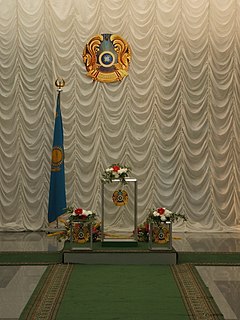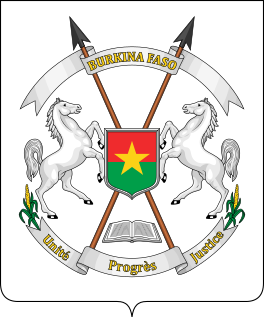
The politics of Ethiopia arise from the way the government of Ethiopia is structured as well as socioeconomic factors. The country's government is structured as a federal parliamentary republic with both a President and Prime Minister.
Regular elections in Croatia are mandated by the Constitution and legislation enacted by Parliament. The presidency, Parliament, county prefects and assemblies, city and town mayors, and city and municipal councils are all elective offices. Since 1990, five presidential elections have been held. During the same period, nine parliamentary elections were also held. In addition, there were six nationwide local elections. Croatia has held two elections to elect 11 members of the European Parliament following its accession to the EU on 1 July 2013.

Elections in Kazakhstan are held on a national level to elect a President and the Parliament, which is divided into two bodies, the Majilis and the Senate. Local elections for maslikhats are held every five years.

At the federal level, Ethiopia elects a legislature. The Federal Parliamentary Assembly has two chambers: the Council of People's Representatives with not more than 550 members as per the constitution but actually nearly 547 members, elected for five-year terms in single-seat constituencies; and the Council of the Federation with 117 members, one each from the 22 minority nationalities, and one from each professional sector of its remaining nationalities, designated by the regional councils, which may elect them themselves or through popular elections.

Elections in Lithuania gives information on elections and election results in Lithuania.

Parliamentary elections were held in Zimbabwe on 31 March 2005 to elect members to the Zimbabwe House of Assembly. All of the 120 elected seats in the 150-seat House of Assembly were up for election.

Ethiopia held general elections on May 15, 2005, for seats in both its national House of Peoples' Representatives and in four regional government councils. Under pressure from the international community, Prime Minister Meles Zenawi promised that this election would be proof that more democracy would come in this multi-ethnic nation; international elections observers from the European Union (EU) and the U.S.-based Carter Center were present to observe the results. This election succeeded in attracting about 90% of the registered voters to the polls. A government ban on protests was imposed throughout the election period.
The Coalition for Unity and Democracy, commonly referred to by its English abbreviation CUD, or occasionally CDU; its Amharic abbreviation, used in Ethiopia, is Qinijit, in English writing often referred to as Kinijit) is a coalition of four existing political parties of Ethiopia which combined to compete for seats in the Ethiopian General Elections held on May 15, 2005. Its leader was Dr. Hailu Shawul.

The Gambela Peoples’ Democratic Movement is a political party in the Gambela Region of Ethiopia. It is the regional ally of the ruling EPRDF coalition.

Presidential elections in Somaliland, an autonomous region of Somalia, were held on 14 April 2003. Results showed that president Dahir Riyale Kahin won by the slightest of margins. The outcome was initially rejected by the main opposition which led to some violence in the country, spurring Somaliland to ban public protests for a 10-day period on April 22. Nevertheless, the International Crisis Group labeled the election a democratic "milestone" for the breakaway state. On 11 May 2003, the Somaliland Supreme Court endorsed Kahin's victory. On 16 May 2003, Kahin was sworn in as Somaliland's first democratically elected President.

General elections were held in Ethiopia on 7 and 18 May 1995 for seats in its Council of People's Representatives; elections in the Afar, Somali, and Harari Regions were delayed until 28 June to assign experienced personnel who could solve possible conflicts and irregularities. This was the first multi-party election in Ethiopia. Several opposition parties boycotted the election, including the All-Amhara People's Organization, Council of Alternative Forces for Peace and Democracy in Ethiopia, and Ethiopian Democratic Unity Party.

Ethiopia held general elections on 14 May and 31 August 2000 for seats in both its national House of Peoples' Representatives and several regional government councils. Although several opposition parties boycotted the election, 17 parties including the All-Amhara People's Organization, the Southern Ethiopia Peoples' Democratic Coalition (SEPDC), and the Oromo National Congress did participate.

A parliamentary election was held in Ethiopia on May 23, 2010.

Ethiopia held nationwide elections for local offices in the kebele and woreda assemblies on 13 and 20 April 2008. By-elections were also held for seats in the Addis Ababa City Council, and in the national and regional parliaments that were vacant due to the Coalition for Unity and Democracy’s (CUD) refusal to participate at the same time. By law, the local elections were supposed to be held as part of the 2005 general elections, but due to the resulting unrest they were postponed.

A parliamentary election was held in the Gambia on 29 March 2012. The election was for 48 of 53 seats in the unicameral National Assembly, with five seats being appointed by the president.

Parliamentary elections were held in Burkina Faso on 2 December 2012. They were the first elections held since the National Assembly dissolved the National Electoral Commission in 2011, following fraud allegations concerning the 2010 presidential elections. Municipal elections for over 18,000 councillors were held simultaneously. The elections were held amidst a period of political uncertainty, following protests against President Blaise Compaore's regime.
General elections were held in Dominican Republic on 15 May 2016 to elect a president, vice-president and the Congress, as well as 20 deputies to the Central American Parliament, municipal councils, mayors and vice mayors. On 15 May 2015 Roberto Rosario, president of the Central Electoral Board, said that there would be about 4,300 seats up for election in the "most complex elections in history".

General elections were held in Zambia on 11 August 2016 to elect the President and National Assembly. A constitutional referendum was held alongside the elections, with proposals to amend the bill of rights and Article 79.

Presidential elections were held in Belarus on 11 October 2015. Long-term president Alexander Lukashenko ran for his fifth term in office, having won every presidential election since independence in 1991. He was re-elected with 83.47% of the vote. The 'against all' option received more votes than any opposition candidate.

General elections were held in Saint Vincent and the Grenadines on 9 December 2015. The result was a victory for the Unity Labour Party, which retained its one seat majority. However, the NDP has challenged the results in two constituencies, North Windward, and Central Leeward.














